No matter your industry, you’re going to have a list of contacts. And the more you grow your business, the bigger that list gets.
As you develop deeper customer relationships, the downside is that the level of attention you can give these contacts lessens. Plus, organizing the various types of contacts in your system takes time and effort.
Luckily, there’s an easy way to manage your contacts, from team members to leads to paying customers. Contact management software keeps your business organized and efficient.
In this blog, you’ll dive into the specifics of this software and find your five best options. Let’s get started!
What is contact management software?
In many ways, contact management software is like an interactive book of all your contacts.
It’s a specialized tool that allows easy access to organized customer data. It’s designed to centralize, organize, and manage all your contact information and related activities.
With features ranging from task automation to dynamic reporting, this software aids in maintaining comprehensive customer profiles.
What is contact management software used for?
Businesses use contact management software to consolidate contact details, interactions, and related tasks in one place. It makes it easy to record and store contact information, such as phone numbers, emails, and notes.
Beyond that, this software:
- Assists in segmentation and categorization of contacts.
- Facilitates efficient tracking of communication history.
- Supports integration with email marketing platforms.
- Offers tools for contact and interaction analytics.
Benefits of using contact management software
These systems optimize and standardize the way you interact with your client network. Here’s how.
Gaining better insight into customer behavior
A contact management solution provides real-time customer behavior insights and supports detailed and dynamic reporting. As a result, you can analyze data points to understand your customers better.
With a system that supports data analytics for informed decision-making, companies can visualize sales history and leverage insights. This helps in improving customer retention rates and increasing cash flow.
Enhancing data organization and accessibility
This software aids in visualizing contact interaction history. It organizes customer data to ensure that you can access and navigate through information with ease.
It also promotes improved team collaboration and communication because it provides features for project and task management to keep everyone on the same page.
Any good customer tracking solution has a user-friendly interface that lets you centralize your data, making it easy to search, update, and share records.
Improving sales and marketing outcomes
A contact management solution improves sales and marketing outcomes, letting your sales teams track leads, opportunities, and deals more efficiently. Not only does this accelerate your workflow, but it keeps you organized as you grow.
With features for lead scoring, you can prioritize prospects and target your marketing efforts more effectively. Some software also comes with expanded channel support for greater reach, ensuring your marketing campaigns are more impactful.
Different types of contact management software
You have a lot of options when it comes to choosing the right contact management system. Here are the different types available to you.
Cloud-based solutions
As is the case with contact management, most software comes in cloud-based solutions. With cloud-based software, you can easily connect with customers from anywhere in the world. Everything from the contact’s name and address to their communication history is stored securely in the cloud.
As a result, you:
- Facilitate seamless customer interactions.
- Can monitor and report on your communications.
- Optimize your sales process.
Platforms like Method, Salesforce, and Zoho CRM are leading examples in this category.
On-premise solutions
Some prefer a contact management platform that offers on-premise solutions. You deploy these systems directly on your company’s network for more control over your data and infrastructure. This makes them ideal for those who prioritize data security.
While they might require a more hands-on approach to maintain and update, on-premise solutions let you customize and categorize data storage to align with your needs.
Mobile applications
The best software also features mobile applications for remote access, ensuring that your teams aren’t stuck at their desks.
With the rise of mobile apps, you can now interact with your contact management system on the go. Whether it’s to view a contact card, schedule calls, or assign tasks, mobile applications maximize efficiency and let you engage with your contacts in real time.
Essential features of contact management software
Here’s a breakdown of the essential features that make these platforms valuable.
Centralized database
A contact management solution provides a centralized database for all contacts, making it easier to identify, classify, and segment contacts.
Because it is optimized for data centralization, this software enables seamless integration with other business platforms. When you integrate your existing systems, you ensure a connected and efficient way of managing contacts.
Automated tasks and alerts
Contact management software provides automated alerts and notifications so no important task or follow-up slips through the cracks. The ability to automatically notify your team lets you stay proactive and responsive, enhancing customer service and engagement.
Communication history tracking
Understanding past interactions with customers provides valuable insights for future engagements. A contact management system streamlines communication processes, letting you track and filter through past interactions efficiently. Plus, you can communicate directly with contacts through the software.
Whether it’s an email, call, or app message, a clear view of your communication history improves customer relationship management.
Sales pipeline management
Contact management software supports sales pipeline management so you can structure your sales processes effectively. It includes features for financial control and management, letting you keep a close eye on revenue.
It also provides features for contact and lead scoring, helping your sales teams prioritize their efforts more effectively.
Email marketing integration
One of the most common communication channels is email. Using software with email marketing tools and integrations significantly enhances efficiency.
On a single platform, email marketing integration lets you:
- Manage your inbox.
- Send out targeted campaigns.
- Track responses.
For example, you can sync Method’s contact management platform with Gmail or Outlook so that all your data is current. Better yet, use the Method: Sidebar for Gmail and Outlook (pictured below) to get your contact data in your inbox.
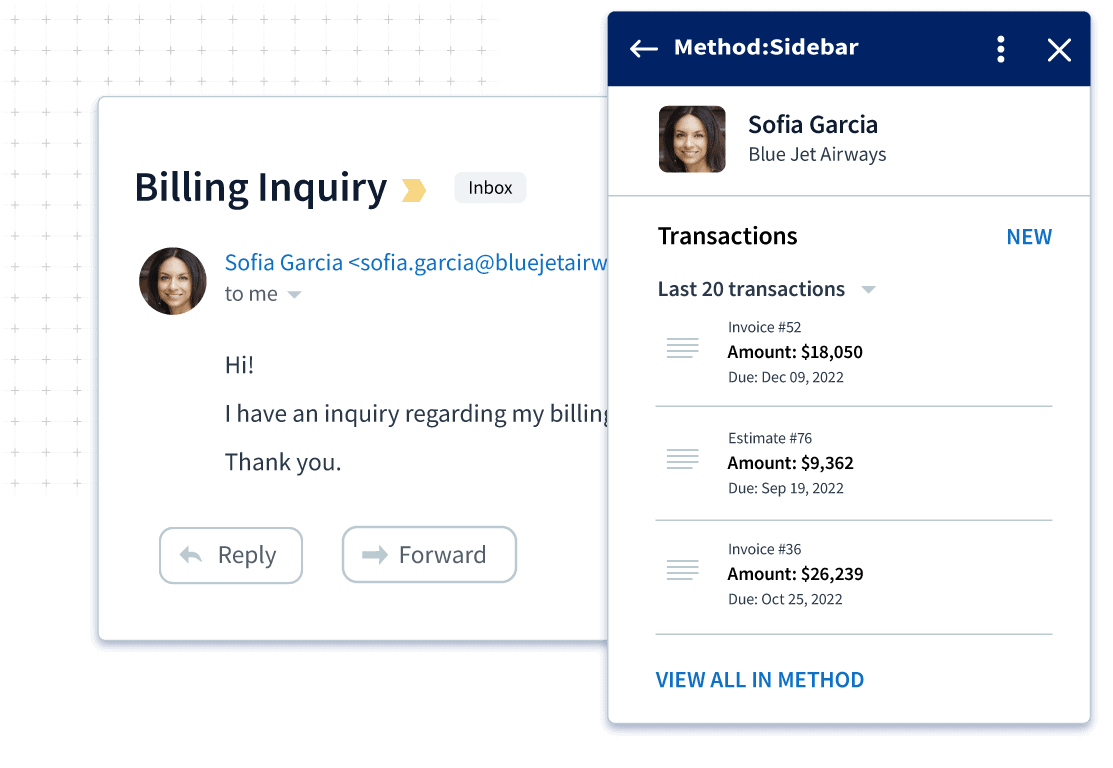
Unlimited users and user licensing
As your business grows, so does the number of team members who need access to your contact management system. A system that allows unlimited users and user licensing ensures that you can scale without any hitches. Whether your company has ten employees or a thousand, everyone can utilize the platform to its fullest.
Basic features and functions
While advanced features are nice, you may end up overpaying for capabilities you don’t need. Simple functionality, like a system that makes data export and import easy, is your top priority.
Other examples of basic features include:
- Contact cards.
- Lead and customer tracking.
- Reporting.
Top contact management software solutions for 2025
Here is your list of the top contact management products for 2025.
Method CRM
Method CRM is the #1 contact management system for QuickBooks and Xero users. It provides you with customizable, drag-and-drop tools to track contacts efficiently and comprehensively.
With Method, separate your leads and paying customers, so you always deliver the best service to your contacts, no matter the nature of your relationship.
This software also boasts advanced automation that takes manual tasks off your team’s plate. Its automatic two-way sync with QuickBooks and Xero means that once those leads move down your sales funnel, there won’t be any duplicates in your database.
Additionally, Method offers:
- Centralized contact management with a 360-degree view of contact details and history.
- Estimate-to-invoice conversion at the click of a button.
- Automated lead collection through web-to-lead forms.
- Online, self-serve portals for your customers.
- Powerful integrations with popular apps like Mailchimp and Google Calendar
- A mobile CRM app for those on the go.
Zendesk Sell
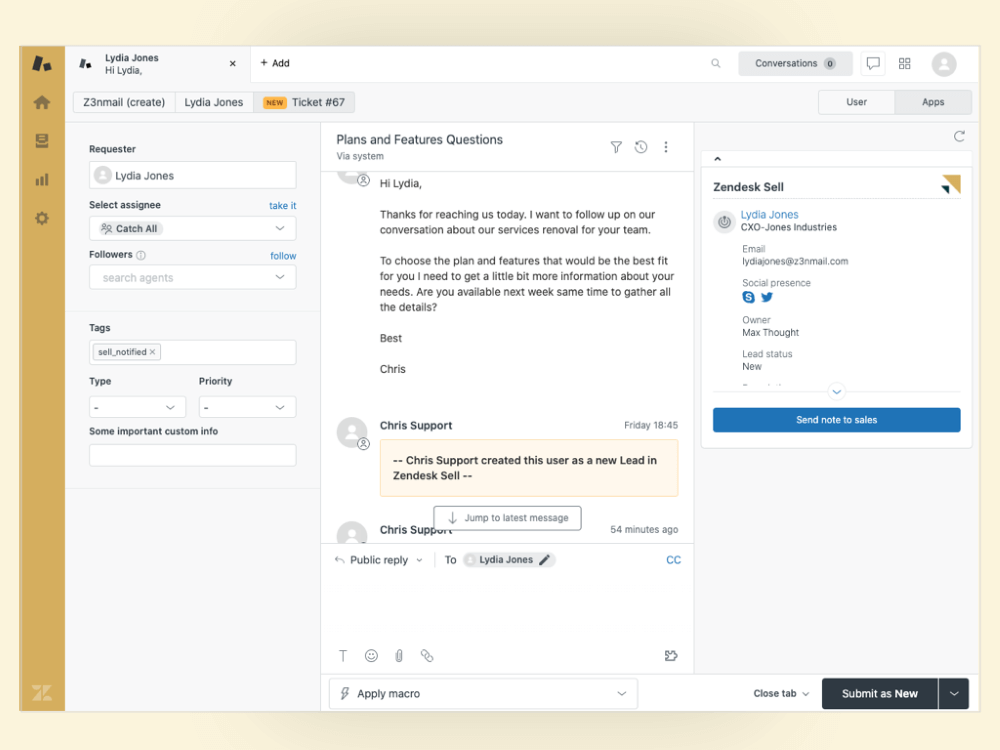
Image credit: Mopinion
As a part of the Zendesk Suite, Zendesk Sell is a contact management solution that improves sales management and sales performance.
For businesses interested purely in boosting sales and increasing revenue streams, Zendesk Sell is a good choice. It’s easy to onboard and keeps your teams organized through project management functionality.
Zendesk Sell’s popular features include:
- An internal ticketing system.
- Sales reports and analytics metrics on a pre-built dashboard.
- Custom sales pipelines.
- Contact cards in the vCard file format with call and text logs.
- Extensive time tracking options.
- Email marketing options with conditional triggers.
- A help center page builder to create self-service knowledge bases.
HubSpot
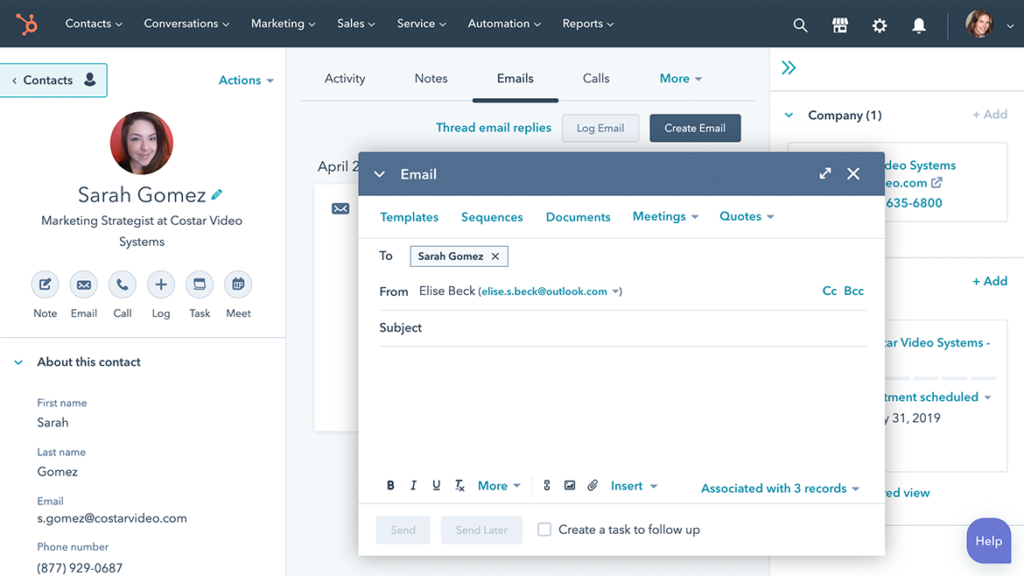
Image credit: HubSpot
HubSpot CRM combines the tools a growing business needs for an all-in-one contact management solution. When we trialed this product, we learned that it offers various operational “hubs”.
The three main hubs include marketing, sales, and service. Small businesses typically bundle hubs together for an all-in-one solution, but you can pick which hubs to subscribe to so you only pay for what you need.
HubSpot is a popular platform for its:
- Lead capture and segmentation tools with nearly unlimited contacts.
- Contact deal and task management.
- Email marketing features like tracking and scheduling.
- Team inboxes for easy collaboration.
- AI-powered sales assistant and chatbots for customer support.
- Large third-party app marketplace.
- Courses and certifications available through HubSpot Academy.
Contact Boss
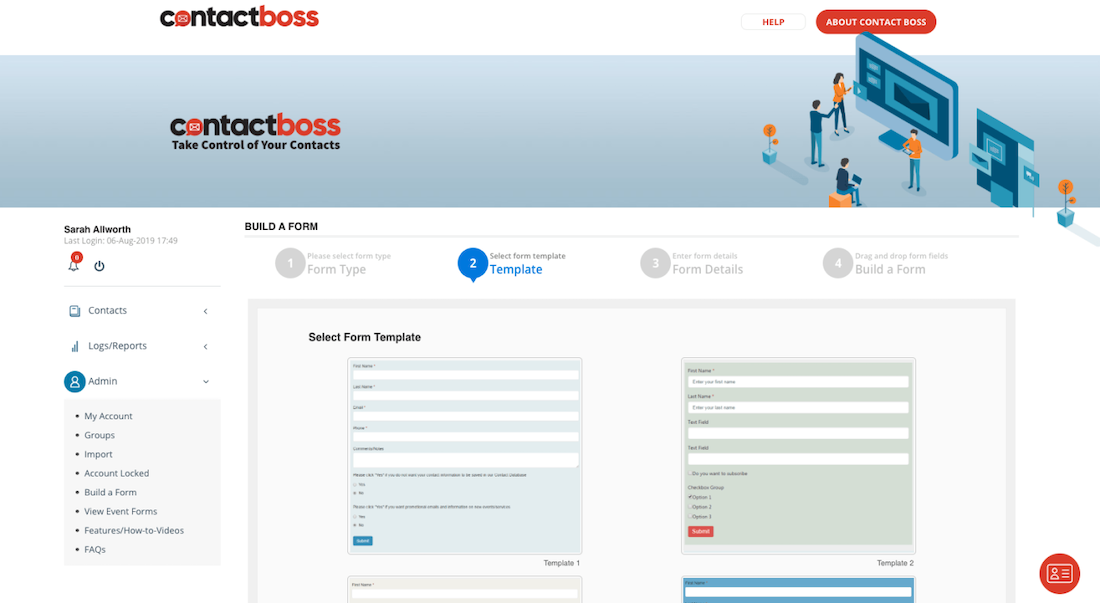
Image credit: TechnologyAdvice
Contact Boss is a cloud-based contact and database management software that users love for its simplicity and ease of use. It’s an affordable option that offers basic functionality, without any of the bells and whistles.
Contact Boss is most renowned for its:
- Comprehensive search feature where you can search by all fields.
- Powerful online contact manager.
- Email integrations.
- Event management functionality.
- Visitor tracking tool.
- Web forms for lead capture and RSVPs.
ActiveCampaign
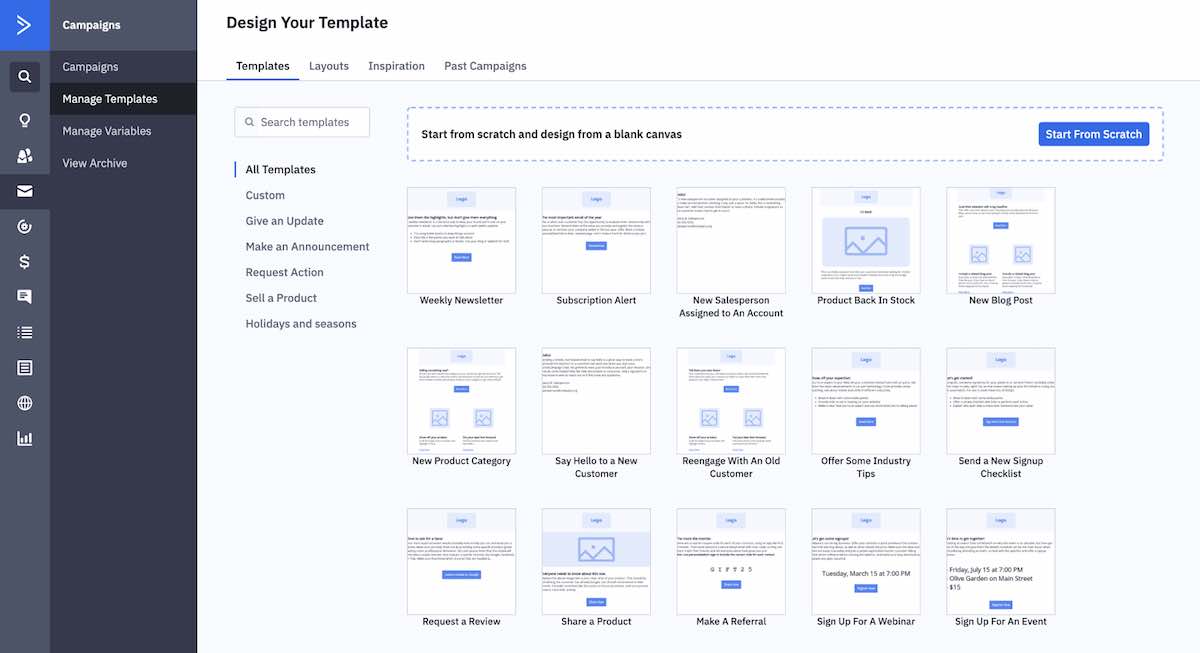
Image credit: ActiveCampaign
ActiveCampaign is a marketing automation platform that simplifies business operations. Catering to businesses of all sizes, it offers several functionalities in a single system, including contact management.
While there’s a steep learning curve for new users and few integrations, ActiveCampaign is a tool worth using for those interested in:
- Targeted email campaigns.
- Multi-channel marketing workflow automation.
- Personalized customer service tools, including chatbots.
- Contact segmentation.
- Reporting and analytics on customer behavior.
How to choose the right contact management solution for your business
Consideration of cost
When selecting a contact management solution, it’s crucial to collaborate with your financial team to ensure you’re making a sound decision. You might choose a provider that offers solutions for cost-effectiveness, ensuring that you get the best value for your investment.
Evaluating scalability
As your business evolves, so should your tools. Implement a system that allows for scalability as the business grows. This way, you won’t find yourself switching platforms just a few years down the line.
Importance of mobile capabilities
Having mobile capabilities is no longer a luxury, but a necessity. Ensure that the solution you choose is accessible on the go so your team can perform actions whenever necessary.
Upcoming trends in contact management software
Increasing automation
Almost all contact management software now includes task automation features. This is because your business ensures improved productivity through task automation. It saves time, boosts morale, and reduces the chances of human error.
Focusing on customer experience and personalization
A one-size-fits-all approach no longer cuts it. Modern software enables customization to suit specific business needs. In other words, it provides tools for customer experience personalization, letting you tailor your interactions to each contact.
Achieving greater reach
Expanding your reach is always important. Implement strategies that tap into new markets and demographics and make sure that your contact management system can handle the influx of new contacts as you go.
Expanding channels
A platform that supports multi-channel communication is a must. Whether it’s through email, social media, or direct messaging, ensure your system can handle communications from various channels.
This way, you can collaborate more effectively with clients and partners, no matter what platform they use.
Understanding the difference: Contact management software vs. CRM
While both tools help manage and organize contacts, CRM software offers a broader range of functionalities. It provides a deep view of customer interactions to help you build and maintain relationships. It also often supports customer service management alongside these tracking capabilities.
On the other hand, contact management software primarily focuses on storing and organizing contact details.
Key takeaways
Contacts are a vital part of every business. The more you grow, the more contacts and contact types you have to manage.
Contact management software goes from a good idea to a necessity as you scale. The good news is that the hard part is over. Now, you’re equipped with your best options to get a handle on your contacts and keep everyone happy.
All you have to do now is try them out and see which one suits your business best.
FAQs
Can contact management software improve my business’ efficiency?
Absolutely! A contact management solution simplifies the process of storing, retrieving, and managing contact details. By having all your contacts organized in one place, you can quickly access the information you need.
How does contact management software aid in sales and marketing?
Contact management software is a foundational tool for sales and marketing teams. By organizing contacts, you can:
- Segment your audience.
- Target specific groups with tailored campaigns.
- Track interactions.
This organization aids in lead generation and follow-ups, ensuring that no potential client falls through the cracks.
How secure is data in contact management software?
Data security is a top priority for reputable contact management software providers. This software offers data security and compliance measures so that your business data is protected and in line with industry regulations. It also ensures secure data storage, so you don’t have to worry about your data getting compromised.
Try out the #1 contact management software for QuickBooks and Xero!
Image credit: Snapwire via Pexels






